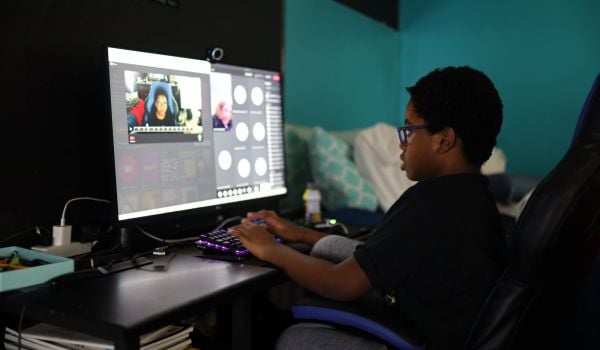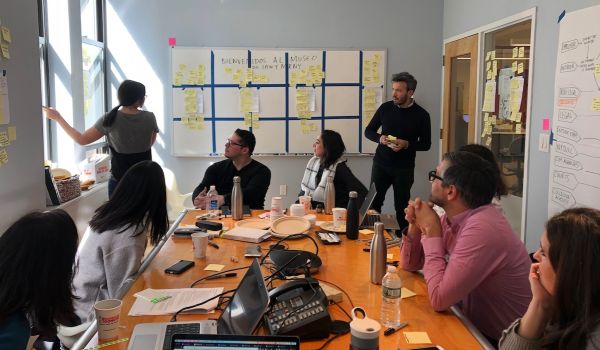“People forget that the Internet is a real thing,” says Bradley Holt, a Burlington technologist. “It’s tangible.”
By that, Holt is referring to the jumble of servers, routers, cables and more that make up our global collection of networks. In his Vermont city of 40,000, Holt helps lead a group of coders, musicians and local media folks who want to answer a pressing question in an age where the Internet is increasingly thought of in terms of NSA spying and avalanches of advertising: Can you craft a piece of that Internet that’s tied to one place on the map, and where people might use it to make their community a better place to live? Or has that ship sailed?
The idea they’re working with is building an online space for Burlington that taps into the city’s fairly accidental but blazingly fast Internet speeds. They call it Civic Cloud, and it will live on donated servers stacked like pizzas in a rack co-located with Burlington Telecom, a municipal-owned and operated telecommunications provider. A $35,000 Knight Foundation grant announced on Wednesday will let them purchase the rest of the equipment needed to build out the apparatus.*
Civic Cloud will host four applications to start. The first is a suite of WordPress-based sites for non-profits, from rescue squads to food banks to historical societies, that aims to knit together a resilient civic sector. The second is Lakecraft, a video game that “gamifies the Lake Champlain Basin.”
The third will focus on streaming music performances from around town, operated by Big Heavy World, a local non-profit that has promoted “Vermont-made” music since the mid-1990s, when it was just a website built by a bunch of musicians looking to bring attention to the local music scene.
Google recently gifted Big Heavy World, according to executive director James Lockridge, with servers and other equipment to help keep its work going. But its staff was intrigued by the Civic Cloud for what it might do for others in their shoes. “We’ve got our corner of the universe already,” Lockridge says. “But accomplishing that while opening up the whole universe of next-generation applications, that’s a lot more comfortable place to be.”
The last application is high-definition video streaming that local media groups might use to broadcast public meetings and cultural events.
Why not tap into the expertise of the Internet’s existing commercial streaming services, like Google+ Hangouts or USTREAM? Speed, Holt says, and freedom. “We can do, like, 1080p streaming, or potentially even 4k or 8k video streaming,” Holt says. Then there’s the matter of subjecting oneself to the terms of service and filtering decisions of companies located elsewhere. “Most of time, you’re probably fine,” Holt says. “But there’s a potential that they could just decide that if they don’t agree with what you’re saying, they could potentially pull the plug on it.”
Local, though, can be a funny concept when it comes to the Internet. The way routing works, an email sent on one side of a city might travel abroad before reaching its recipient across town, simply for efficiency’s sake. Civic Cloud can’t ensure that, say, a session of Lakecraft won’t bounce beyond Burlington. “But with the network and the cloud being locally controlled,” Holt says, “there are a lot more things in place to mitigate the possibility of that happening.”
The tendency of Internet traffic to travel far and wide is one reason the NSA has been so able to tap transmission. Holt appreciates the point, but says that simply using a service like, say, YouTube, involves its own kind of exposure. “If you’re going to use a live streaming service,” he says, “you’re likely going to have to give up some privacy so that they can target ads to you.” It is, he says, a question of the very nature of the modern Internet experience. “We live in this world where the Internet is overly commercialized. Where are the non-commercial spaces?”
Burlington has something in its back pocket that other cities don’t: A ridiculously speedy network, one that’s probably about a hundred or so times faster than what you have at home. Big telecom providers have focused on serving up broadband to the country’s dense places, which doesn’t exactly include Vermont. So the city stepped in, opting for a gigabit-fast fiber-to-the-home network.
Burlington Telecom has struggled to pay for itself, but just this fall the city was named a partner for US Ignite, a project of the National Science Foundation and the White House’s Office of Science and Technology Policy. The effort aims to figure out real uses for Internet connections that are, at the moment, bigger than any human can really use.
Eventually, Holt says, any local developer or civic hacker should be able to log on to Civic Cloud remotely and “go provision a new server for themselves,” where they might play around with creating new apps and tools that make use of the full gigabit.
Burlington isn’t alone in its attempt to home-grow a piece of the Internet. There’s Brooklyn’s Red Hook WiFi, Kansas City’s KC Freedom Network and Berlin’s Freifunk. Those who study community-centered Internet projects, however, say that they’re often condemned to remain nerdy proof-of-concept experiments that normal people never actually use. The ambition in Burlington, then, is to use the city’s super-fast connection to get people to start seeing the Internet as something very real indeed, and something they may want to help build and run themselves.
“Having these things local means that local people are controlling it,” Holt says. “And the way it’s governed can reflect the values of our own local community.”
*The Knight Foundation provides funding for this column but has no relationship with its editorial content.

Nancy Scola is a Washington, DC-based journalist whose work tends to focus on the intersections of technology, politics, and public policy. Shortly after returning from Havana she started as a tech reporter at POLITICO.
















